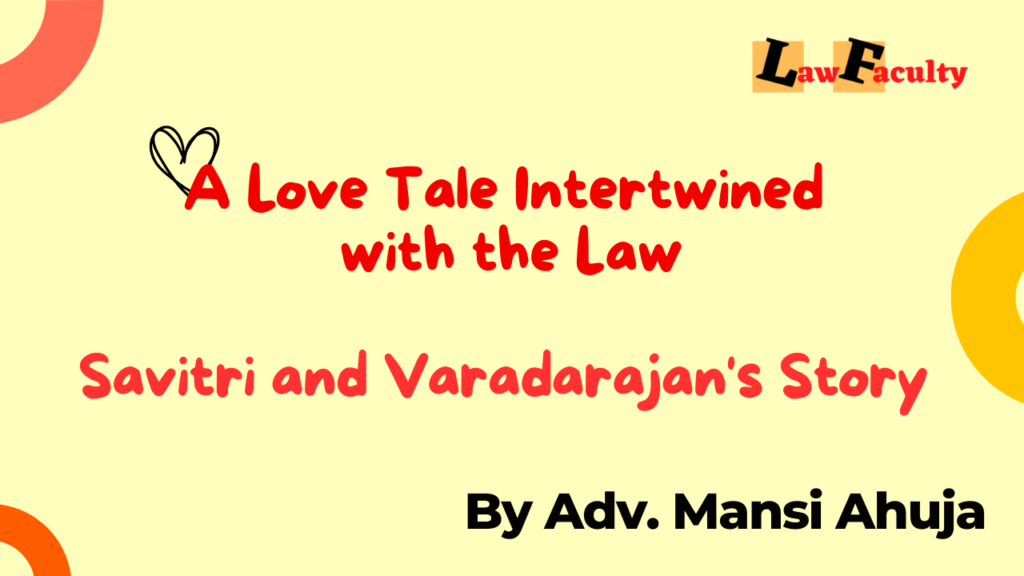
A Love Tale Intertwined with the Law: Savitri and Varadarajan’s Story
This article is written by Adv. Mansi Ahuja. (B.Tech., LLB (DU), LLM (Buckingham University)
The Story: S. Natarajan lived in Nungumbakkam in 1960 with his two daughters, Rama and Savitri. The events in issue were brought about by Savitri’s friendship with their neighbor Varadarajan. When Savitri told her sister Rama on September 30, 1960, that she wanted to marry Varadarajan, their father tried to keep them apart by having Savitri go away.
In addition to being a tale of passionate defiance, Savitri and Varadarajan’s love story is a legal milestone that pushes the limits of India’s laws regarding kidnapping. A legal dispute that culminated in the Supreme Court was caused by Savitri, a minor, choosing to live with Varadarajan instead of her guardian’s house. The fact that Savitri departed on her own volition and without being coerced by Varadarajan, as the Supreme Court decided to exonerate him, emphasizes how crucial the minor’s agency and permission are in situations like this. Legal fraternity should learn a valuable lesson from this case, which shows how laws are applied in practical settings when feelings and the law collide. It emphasizes how important it is to read legal documents with the specific facts of each case in mind.
In the context of legal guardianship, the idea of minor consent is a nuanced and complicated matter. The developing concept of minor autonomy is highlighted by the Supreme Court’s sophisticated approach in distinguishing between a minor’s voluntary accompaniment and being taken. This judicial viewpoint recognizes that minors may display some agency in certain situations. The legislation strikes a balance between acknowledging minors’ ability to make informed judgments in some situations and maintaining the tradition of protecting them.
The Finality: Redefining Kidnapping in the Light of Wilful Concomitance and Accompaniment
The decision of the Supreme Court in the case of Savitri and Varadarajan is a remarkable milestone in the development of kidnapping jurisprudence in India. Distinguishing between ‘taking’ and ‘accompanying’, the court created a precedent that emphasizes the importance of individual will and consent in the context of minors as well. The opinions of the Supreme Court in this significant case highlight an important distinction in the legal definition of ‘taking’ a minor away from their guardian. The court made a clear distinction between a minor who voluntarily left their guardian’s care to be with someone else and a person who actively enticed or took a minor. Words like ‘taking’ and ‘accompanying’ which are vital in understanding legal passages, are closely scrutinized by the Indian judiciary, particularly in kidnapping cases involving youngsters.
The subtle distinctions between allowing a minor to ‘accompany’ someone and ‘taking’ them have been brought to light by the Supreme Court of India. Whether there was any inducement or compulsion involved, as well as the minor’s autonomy and permission, will determine how things differ. The court believes that unless the individual deliberately urged or pressured the minor to leave, they cannot be charged of ‘taking’ if the minor, fully aware of the implications, chooses to leave their guardian’s care to be with someone else.
Legal fraternity needs to be aware of the nuances of this decision, as it affects not just the rules pertaining to kidnapping but also the larger conversation about individual freedom, self-determination, and safeguarding minors. When evaluating the intricate relationship between guardianship rights and individual liberties, this case is a crucial point of reference.
Case name : S. Varadarajan vs State Of Madras 1965 AIR 942.
